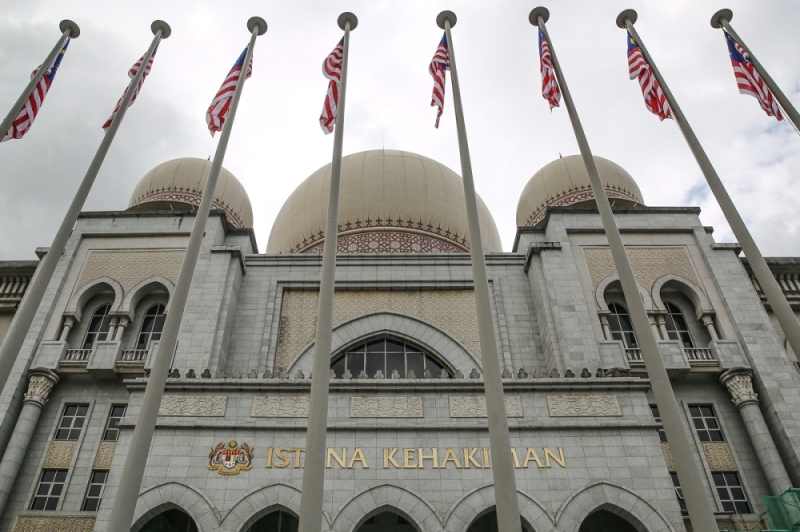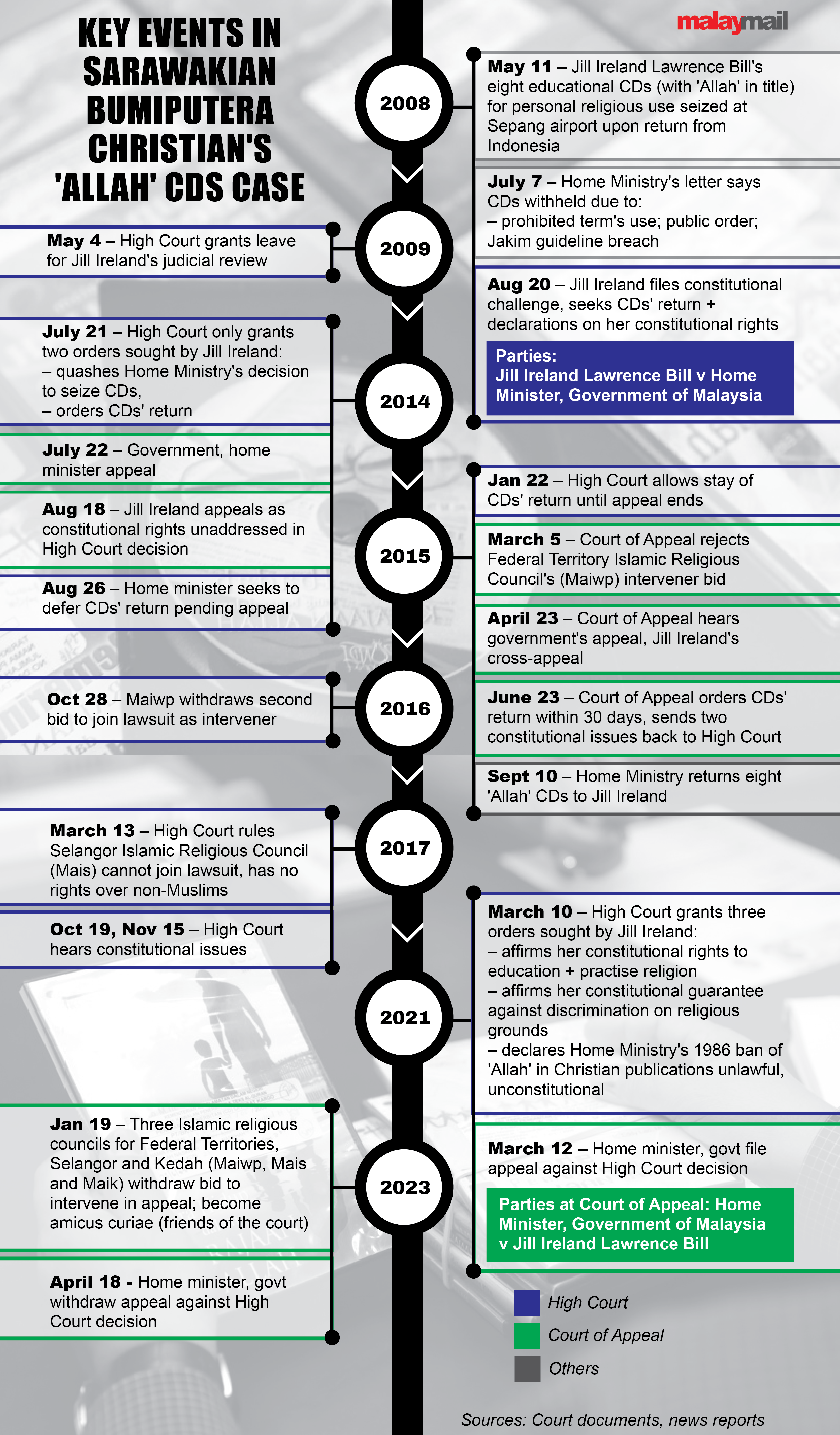Timing of ‘Allah’ appeal withdrawal throws neutral Malay vote up in the air, analysts say

It was discovered on Monday that the national unity government under Prime Minister Datuk Seri Anwar Ibrahim has withdrawn the appeal, effectively concluding the legal battle that began after authorities seized eight CDs containing the word ‘Allah’ from a Christian Sarawakian 15 years ago. — Picture by Yusof Mat Isa
Thursday, 18 May 2023 7:00 AM MYT
KUALA LUMPUR, May 18 — Ending the appeal of a court ruling over the use of “Allah,” the Arabic word for God, in Christian publications so near to six state elections will disadvantage parties in the national unity government with Malay-Muslim voters.
Despite the consequences, however, Nusantara Academy for Strategic Research senior fellow Azmi Hassan said the government likely had little choice in the matter as case management had already been set for May 19.
“The government had to withdraw, else it would have created another turmoil seeing as the government right now is composed of Gabungan Rakyat Sabah, Gabungan Parti Sarawak of the Borneo states.
“This is a sensitive issue not just here in the peninsula, but also in the Borneo states,” he told Malay Mail.
In March 2021, the High Court deemed that a 1986 government ban on using the word “Allah” in Christian publications was unlawful and unconstitutional.
The government under Perikatan Nasional (PN) chairman Tan Sri Muhyiddin Yassin at the time had decided to appeal the court decision.
However, it was discovered on Monday that the national unity government under Prime Minister Datuk Seri Anwar Ibrahim has withdrawn the appeal, effectively concluding the legal battle that began after authorities seized eight CDs containing the word “Allah” from a Christian Sarawakian 15 years ago.
According to International Islamic University political science associate professor Syaza Shukri, the development would let PN in the federal Opposition depict Pakatan Harapan (PH), Barisan Nasional, and others in the national unity government at “anti-Islam.”
This would also play to the strengths of PN, a coalition consisting entirely of Malay-Muslim lawmakers, which already deployed communal politics in the 15th general election that saw it nearly forming the government on a wave of support for its religious conservatism.
Syaza said that while there was no “good time” for such a religiously sensitive decision in Malaysia, its emergence so close to six crucial state elections was strategically poor.
“Most Muslims in Malaysia still believe strongly that the word Allah is Islamic in nature, regardless of what historians and linguists say.
“Those Malays who are more on the fence with how they feel towards the government may choose to stay out of the election, if not outright vote for PN,” she said.
Kedah, Kelantan, Negeri Sembilan, Penang, Selangor and Terengganu are all expected to dissolve their state assemblies in the latter half of June to pave way for state elections that were needed now because they were not held during the 15th general election last November.
Azmi said that one possible solution for the unity government was for Umno to be publicly disagree with the decision to drop the appeal, in a bid to reinforce its position as champions of Malay and Muslim interests.
He said this would be needed to counter PN’s ongoing narrative that it was the true defender of Malay-Muslim interests.
“A strong Umno would make a strong PH and unity government,” said Azmi.
Yesterday, Anwar said his government will seek an audience with the Conference of Rulers over the use of “Allah” in a non-Muslim context “to resolve this issue holistically and cohesively.”
However, Universiti Kebangsaan Malaysia professor Kartini Aboo Talib disagreed with the notion that the unity government or the political coalitions within it have suffered significant damage from the appeal being ended.
“The unity government is clearly focused on business. Their approach to convince voters will be strategic.
“Upon forming the government, political parties gain many more advantages, including access to opportunities in areas such as land development, vendor selection, GLC appointments and securing contracts for transportation improvements, among others.
“People may call it nepotism, but others may call it network,” she said.
This week, the federal government confirmed withdrawing the appeal against the 2021 High Court ruling in favour of the Sarawakian native, Jill Ireland Lawrence Bill.
The move put an end to the 15-year-long legal saga that began when the government seized the Sarawak Bumiputera’s eight educational compact discs (CDs) containing the word “Allah”, the Arabic word for God, which were for her own use.
Read here for Malay Mail’s summary of the High Court’s 96-page judgment to understand why the government’s 1986 ban was found to be unlawful and unconstitutional.

Thursday, 18 May 2023 7:00 AM MYT
KUALA LUMPUR, May 18 — Ending the appeal of a court ruling over the use of “Allah,” the Arabic word for God, in Christian publications so near to six state elections will disadvantage parties in the national unity government with Malay-Muslim voters.
Despite the consequences, however, Nusantara Academy for Strategic Research senior fellow Azmi Hassan said the government likely had little choice in the matter as case management had already been set for May 19.
“The government had to withdraw, else it would have created another turmoil seeing as the government right now is composed of Gabungan Rakyat Sabah, Gabungan Parti Sarawak of the Borneo states.
“This is a sensitive issue not just here in the peninsula, but also in the Borneo states,” he told Malay Mail.
In March 2021, the High Court deemed that a 1986 government ban on using the word “Allah” in Christian publications was unlawful and unconstitutional.
The government under Perikatan Nasional (PN) chairman Tan Sri Muhyiddin Yassin at the time had decided to appeal the court decision.
However, it was discovered on Monday that the national unity government under Prime Minister Datuk Seri Anwar Ibrahim has withdrawn the appeal, effectively concluding the legal battle that began after authorities seized eight CDs containing the word “Allah” from a Christian Sarawakian 15 years ago.
According to International Islamic University political science associate professor Syaza Shukri, the development would let PN in the federal Opposition depict Pakatan Harapan (PH), Barisan Nasional, and others in the national unity government at “anti-Islam.”
This would also play to the strengths of PN, a coalition consisting entirely of Malay-Muslim lawmakers, which already deployed communal politics in the 15th general election that saw it nearly forming the government on a wave of support for its religious conservatism.
Syaza said that while there was no “good time” for such a religiously sensitive decision in Malaysia, its emergence so close to six crucial state elections was strategically poor.
“Most Muslims in Malaysia still believe strongly that the word Allah is Islamic in nature, regardless of what historians and linguists say.
“Those Malays who are more on the fence with how they feel towards the government may choose to stay out of the election, if not outright vote for PN,” she said.
Kedah, Kelantan, Negeri Sembilan, Penang, Selangor and Terengganu are all expected to dissolve their state assemblies in the latter half of June to pave way for state elections that were needed now because they were not held during the 15th general election last November.
Azmi said that one possible solution for the unity government was for Umno to be publicly disagree with the decision to drop the appeal, in a bid to reinforce its position as champions of Malay and Muslim interests.
He said this would be needed to counter PN’s ongoing narrative that it was the true defender of Malay-Muslim interests.
“A strong Umno would make a strong PH and unity government,” said Azmi.
Yesterday, Anwar said his government will seek an audience with the Conference of Rulers over the use of “Allah” in a non-Muslim context “to resolve this issue holistically and cohesively.”
However, Universiti Kebangsaan Malaysia professor Kartini Aboo Talib disagreed with the notion that the unity government or the political coalitions within it have suffered significant damage from the appeal being ended.
“The unity government is clearly focused on business. Their approach to convince voters will be strategic.
“Upon forming the government, political parties gain many more advantages, including access to opportunities in areas such as land development, vendor selection, GLC appointments and securing contracts for transportation improvements, among others.
“People may call it nepotism, but others may call it network,” she said.
This week, the federal government confirmed withdrawing the appeal against the 2021 High Court ruling in favour of the Sarawakian native, Jill Ireland Lawrence Bill.
The move put an end to the 15-year-long legal saga that began when the government seized the Sarawak Bumiputera’s eight educational compact discs (CDs) containing the word “Allah”, the Arabic word for God, which were for her own use.
Read here for Malay Mail’s summary of the High Court’s 96-page judgment to understand why the government’s 1986 ban was found to be unlawful and unconstitutional.

No comments:
Post a Comment